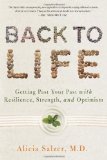
 Back to Life
Back to LifeGetting Past Your Past with Resilience, Strength, and Optimism
Review posted September 8, 2012.
William Morrow (HarperCollins), 2011. 278 pages.
Starred Review
Back to Life is a book about resilience, a book about thriving after trauma.
Here's what Alicia Salzer says about trauma in her Introduction:
For the purposes of this book, a trauma is any event or situation that fundamentally shakes our understanding of the world and of our place in it.
Certainly this includes all the horrors that one typically thinks of when the word "trauma" is used. But in my opinion it also includes a host of other experiences that leave us reeling because the "rules" of life seem to have suddenly changed. In this view, a trauma might be a health issue, a betrayal, the loss of an apartment or job. When a life event robs you of your sense of well-being and self-esteem and leaves you feeling unsafe or out of control -- that's a trauma, too.
To be fair, I read this book after I'd already dealt with most of the trauma of my divorce. But in many ways, the book was good confirmation that I'm on the right track in healing. I definitely recognized her descriptions of being deep in the trauma, and I thoroughly relished her ideas for dealing with it even at this level.
For a very long time, I had lots of trouble with flashbacks -- mostly replaying arguments and piecing together when my husband was lying and what I should have said had I known the truth. (Okay, I'll stop. Just writing that sentence put me in danger of obsessing again!) It was actually a different book that said betrayal is trauma (NOT "Just Friends") that helped me realize flashbacks are completely normal, and not to get mad at myself for having them, but just, when I notice, turn my mind a different way.
Alicia Salzer presents several strategies for coping with the coping mechanisms that crop up. One is to name the nasty inner voice:
We talked in a previous chapter about how symptoms like nightmares and flashbacks are misguided but well-intentioned stabs at self-protection. In the same way, much of what keeps us in permatrauma are ways of thinking and coping that were developed in a time of tremendous, overwhelming stress. We bring these coping strategies to our current lives in an attempt to safeguard ourselves from future harm. But the way you learned to cope on the worst day of your life is no way to live the rest of it.
I've named my nasty inner voice Moodith because it's funny and dismissive and reminds me that she's not a good advisor, but Hatelyn, Buzzkill, or Mr. Misery will work just as well. Feel free to come up with your own dismissive moniker.
You can see from this example that she approaches healing from trauma with humor and humility.
Now, I didn't do too many of her actual exercises, but I was uplifted and encouraged by her ideas. I do think reading this book helped me stay on the right track. Some of the Resilience Skills she goes through are: Flexibility, Accountability, Self-Efficacy, External Efficacy, Rosewashing, and Community. These are all great skills to build.
I also adapted her strategy at the end for changing how you feel. I modified her version, but basically it involves using a physical prop, a stone, to remind you of a positive thing you need to do or think about.
I fondly hope I will never go through major trauma again, but I know that's not too likely. If I find myself in the depths again, struggling with discouragement, or if I feel I just need a reminder of the vibrant life I'd like to be living, that would be a good time to reread this book.

